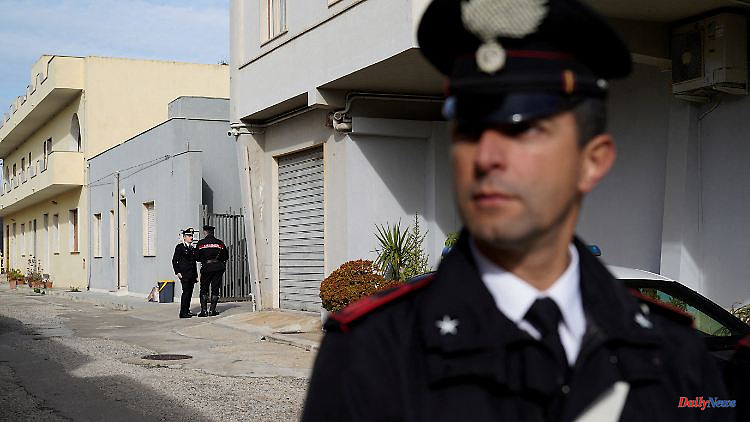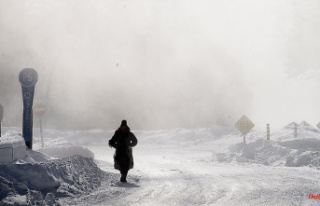The capture of the mafia boss is a relief for the homeland of Matteo Messina Denaro. "It's time for a basta," says the mayor. Legends have already grown up about the arrest. But Viagra packs refute them.
The arrest of Matteo Messina Denaro is a turning point for Sicily. The Italian state had searched in vain for the Cosa Nostra boss for 30 years. It was a sign of his unbroken power. The people of Campobello di Mazara, where he had his last secret apartment, and of Castelvetrano, the neighboring town where he was born, knew he was among them somewhere. But they also knew that even if they should recognize him on the street, it was better for them not to see him.
Messina Denaro had become a ghost in his closest home. Exactly what a perfect boss of the Cosa Nostra wants to be. He was seen again and again somewhere, but he was never caught. The boss had informants at all levels. The municipal administration of Castelvetrano was last dissolved and provisionally managed in 2017 because of "infiltration by the mafia". Only since 2019 has an elected mayor, Enzo Alfano, been in office again. It was he who, ten days after the arrest of the boss, called the citizens of Castelvetrano and Campobello di Mazara to a demonstration of joy and thanks. The fear that it could be a flop was great. But to everyone's surprise, a good 1000 citizens came to the center of the small town, right in front of the last hiding place.
At the rally in the heart of Matteo Messina Denaro's old empire, chants can be heard that are rare in Sicily: "Viva lo Stato", long live the state, and then a beautiful play on words: "La Sicilia è nostra, non di Cosa Nostra ", Sicily belongs to us, not "to our cause", not to "Cosa Nostra".
In the dark, with a cold wind, they dare. A great many ordinary citizens and families stand next to the activists of the anti-mafia fight, such as the group of Catholic scouts, who have been fighting a lost battle for years: "Now we are no longer alone," says the head of the group. "Finally. Now we can do it."
"It took thirty years, too many years," said Mayor Enzo Alfano in a speech. "The mafiosi have plundered the country here. Now let's lick our wounds, it was a terrible time. But I would like to ask you something else now. Let's stop saying 'the mafia family', the 'mafioso'. Let's call them what they are: killers! They're really just killers and traitors, they didn't even have any respect for the children. It really is time to say basta."
Giusi Capizzo came to the rally with her son and husband, she lives just a few steps from the boss's old hiding place: "We feel liberated. Today a new era begins so that our children can have a new future, without oppression by the Mafia. We are on the side of the state - we hope that the state is always on our side."
That's the whole point. The mafia is so strong here, in one of Europe's poor houses, because it has "jobs" to offer. Small, lousy jobs as a protection money cashier, as a courier. But better than nothing. Either you come to terms with the mafia or you emigrate. To the north or away from Italy. "The state must also create jobs for young people here, create a mafia-free economy," demands Giusi Capizzo.
Matteo Messina Denaro could not only rely on informants in the mayor's offices. The Messina Denaro mafia family worked on the estates of the long-established noble family D'Alì Staiti, which among other things also owned the "Banca Sicula di Trapani" and the salt mines of Trapani. In 2022, a member of the family, Antonio D'Alì Staiti, was finally sentenced to six years in prison for aiding and abetting the Mafia. The Baron is in a Milan prison. It is interesting that this man was Senator of the Republic for Berlusconi's "Forza Italia" party from 1994 to 2018, was even State Secretary in the Ministry of the Interior from 2001 to 2006, and also President of the Province of Trapani between 2006 and 2008.
The verdict against the ex-senator states that he "was available to Matteo Messina Denaro". So the senator was a henchman of the mafia boss. In view of such contacts, it is not surprising that the boss remained "untraceable" for so long. An indication of how much still needs to be cleaned up in the state.
Again and again one tried to get on the track of the boss. For two years, from 2004 to 2006, even a former mayor of his hometown of Castelvetrano, Antonio Vaccarino, wrote long letters with the boss. Letters delivered through trusted intermediaries: Any kind of electronic contact was absolutely taboo. In Mafia jargon, these letters are called pizzini, small letters.
In the pizzini, the boss is cultivated. He writes that he has "accepted his destiny, his destiny," that he no longer believes in Christ, but only in the rules of Cosa Nostra. In it he calls himself "Alessio", he addresses his letters to "Svetonius", a figure from Roman history, the pseudonym of the former mayor who was a close friend of "Don Ciccio", from Francesco Messina Denaro, Matteo's father. Matteo Messina Denaro inherited the position of boss of the Castelvetrano mafia family from him.
Incidentally, the conversation between the father's friend and the boss was an idea of the secret service, whose informant the former mayor had become. Matteo noticed that and his last message to the "traitor" was that his name was "written in his last will, the debt will be paid", of which he should be certain. There it was again, the power of the mafia: "They have the power to kill a person whenever and wherever they want," judge Paolo Borsellino once defined.
Cosa Nostra has made almost no use of this power in the last twenty years. Murders jeopardized the smooth running of business. Unlike under his predecessors Toto Riina and Bernardo Provenzano, Cosa Nostra under Matteo Messina Denaro no longer sought direct confrontation with the state, as in the bomb attacks on judges in Palermo and on memorial sites in Italy in 1992 and 1993, which killed dozens. Under him, they turned their attention back to the classic business: extorting protection money, cashing in public contracts. The death threat remained in the background but was present.
Palermo's chief prosecutor, Maurizio De Lucia, had to be more than careful, he said at the meeting in the Palermo courthouse, where judges Paolo Borsellino and Giovanni Falcone used to work. Too often the boss had disappeared again shortly before access. He had his ears and eyes everywhere: "Surveillance technology was used, we had to search the internet for the information about the disease, we had to pinpoint where he was going to show up for treatment." Because the starting point was the information from tapped conversations of relatives that he had been operated on an intestinal tumor. "Very few people were informed of our investigation." The Italian cancer registry was also evaluated discreetly. Among the diversionary measures was that the report of a carabinieri from Campobello di Mazara, who claimed to have seen the boss in the flesh, was officially classified as a "false report": In reality, the man had seen correctly, but it was still too early to access because no one knew where he was. That's how you weighed the boss to safety.
For anti-mafia prosecutor De Lucia, the arrest is a huge success: "He was the last person responsible for the 1992 to 1993 bombings who was still at liberty, I want to remind you of that: all the other people responsible were caught in the last thirty years and sentenced to life imprisonment. Cosa Nostra loses a boss and we have proven that we are capable of tracking down the most sophisticated criminals. The state does not forget. Even after thirty years we caught him."
De Lucia emphasizes how important the arrest is for all of Italy. Messina Denaro's mafia also wanted money from the European reconstruction fund for Italy: "If we weaken the mafia, they will have fewer opportunities to get this aid." The prosecutor emphasizes that the battle is not yet finally won. "We have to increase the pressure on them by all means: by tapping phone calls, by tapping rooms, by following the statements of renegade mafia members. We've won a battle. The war isn't over yet, but this time it is State won."
When the judge Falcone, his wife Francesca Morvillo and the three police officers from the bodyguard, among them the then 27-year-old Vito Schifani, were laid out in the cathedral of Palermo on May 25, 1992, his widow Rosaria Schifani gave the funeral speech. To this day, she stirs everyone who hears her. "I now turn to the men of the mafia, because they are in here too, know that forgiveness is possible for you too. I forgive you, but you must get on your knees! If you have the courage to change!" Emanuele, the son of Vito and Rosaria Schifani, was born just four months earlier.
And today? Does Rosaria Schifani expect Matteo Messina Denaro to take a knee? "When I heard about his arrest, I was just happy at first, a weight was lifted from my heart," she says. "Finally they caught him, after thirty years. But ask for forgiveness? He probably won't do that. He knows too many secrets, he won't get away from the mafia. A mafioso is like an alcoholic. Both have the choice in own hand. He has to decide for himself whether he wants to live sober or as an alcoholic, as a mafioso."
Rosaria cannot forget the young police officers who were shredded by the 1992 bombs. "Every time I think of the young men who are gone today, I feel bad. Young police officers who had so much desire to live. I immediately thought of them. They are no longer there, yes the mothers were the ones who suffered the most in these last thirty years. I remember when we, as relatives, were guests of the President afterwards. There sat on my right the mother of Rocco Dicillo, who had also died in Capaci. Me I saw a woman with her face petrified like a statue, motionless in her pain. Having experienced that pain I will never forget."
A legend immediately grew up around Messina Denaro's arrest on January 16: In reality, he "surrendered" and there were negotiations between the state and Cosa Nostra. As early as November 2022, a former mafia supporter, Salvatore Baiardo, said in a TV interview that the boss wanted to surrender, also because he was ill. In exchange for the abolition of Italy's ongoing preventive detention for killers and mafia bosses.
The fact that several packages of Viagra were found when the hiding place was searched speaks against this assumption. Being a "super macho" is an essential part of the legend of a boss. This is incompatible with pharmaceutical help. If Matteo Messina Denaro had voluntarily surrendered, he would have left condoms on the table, but no doubt disposed of the Viagra packs first.












